Star Trek: First Contact, Star Trek: Insurrection, Star Trek: Nemesis
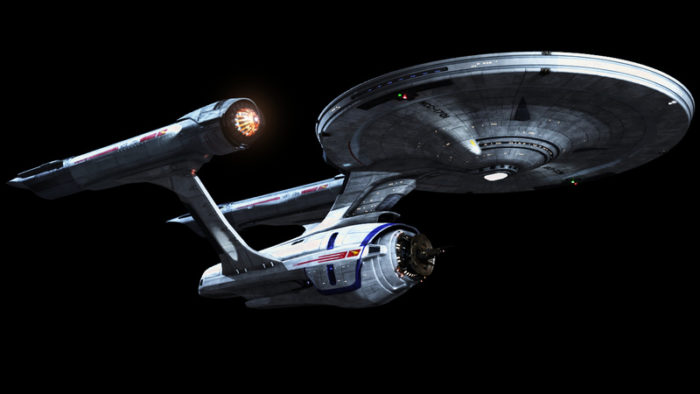
These reviews will contain spoilers.
David’s Log, stardate 24 February, 2019. Having reluctantly come to terms with the passing of the classic crew, I was looking forward to getting acquainted with The Next Generation of space explorers. Despite them seeming to be most fans’ favourite incarnation, aside from Captain Picard the team hasn’t amassed the same pop culture recognition as their predecessors. Indeed, these are movies I knew next to nothing about despite being a regular cinema-goer, and movie magazine reader, as they were made. Heck, I worked behind the popcorn counter when Nemesis came and went with little fuss. Not that this is a necessarily a reflection on their quality of course – at HorrorCultFilms box office performance doesn’t tend to mean much, nor does popularity. Yet it’s a reminder that the brand is more than the sum of its parts. This is not something one can say about obvious rival Star Wars, which is yet to release a movie that’s not tied to its first and seems to fail the further it strays. In Generations, Riker and Whorf seemed interesting enough side characters – even if they were greatly underused. Freed from the weight of James T. Kirk, and the pressure to give him a send-off fit for a captain (a challenge the makers ultimately failed to deliver) I hoped I’d maybe grow to love them as I did the old gang. So it was with a spring in my step, and my usual bottle of booze I went to watch parts 8 through to 10. It was also, I should add, with a smidge of disappointment, given I knew they are the last entries in the main timeline.
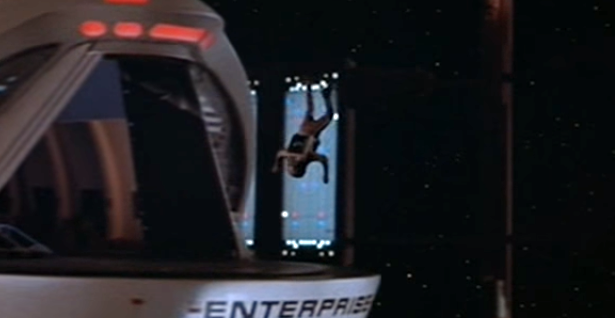
On a similarly sentimental point, something this experience has taught me is the value of watching films with the right company. Not to turn myself into a one-man circle jerk for my friendship group, but it’s been a blast getting to know the series with a combo of Trekkies and a fellow novice (albeit far less one than myself). Not least because the pairing of good banter and non-Romulan ale makes even the worst entries fun. For instance, my mind casts back to The Motion Picture when a lone astronaut gracelessly falling through space became the sole source of entertainment amidst the prolonged spaceship porn docking scene. His aimless drift and, aged mannequin-like movements by the Enterprise, gave a franchise best known for its optimism a nihilistic quality. From that moment forth he became known as Floaty Jeff. To sound grand, his brief ballad was simultaneously a stand-in for the vastness of the Trek universe, everyone who has ever looked at the stars in wonder, Icarus flying to close to the sun and the complete emptiness of the film itself. Along with looking really fucking funny. His lasting legacy was to undercut otherwise serious scenes with snide jokes and gave us something to holler whenever a person dawned a spacesuit – which happens often in Star Trek. Given the central theme of having the best people by one’s side, it’s perhaps fitting that this franchise has made me think about friendship. So to my crew, and Floaty Jeff, I’d like to say a thank you. Now with the sappy stuff out the way let’s cover the movies, starting with:
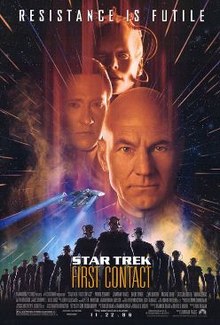
Star Trek: First Contact (1996)
Conveniently, the crash at the end of Generations means First Contact is the first in a new trilogy about the Starship Enterprise NCC-1701-E model (you can thank me if that comes up in a pub quiz). Given the ham-fisted fighting of this predecessor, which watched like three old men got drunk on a hill, I was surprised to see Jean-Luc so comfortably transition into an action star. He’s Bruce Willis down to the balding head and vest-top. If that wasn’t enough, there’s robot sex, dick jokes and officer Worf going gung-ho to the point it seems like a suicide mission. Who said Star Trek couldn’t be cool? Then, in what few quiet moments we have, Riker swaggers with a Big Dick Energy that could come only from sitting in the director’s chair. Yes, onscreen second in Command Jonathan Frakes brings us First Contact: a movie takes hits the warp drive early on and doesn’t let-off ‘til the credits. The opening 15 minutes alone do more heavy lifting (including a stunning opening shot, enough exposition to create tension, the introduction of the new ship and a huge action set-piece) than all of the last one. It’s an examplary piece of efficient world-building, with not a single line of dialogue is wasted.
The film’s relentless pace is helped by The Enterprise taking on a worthy adversary. This time around, the enemies are the Borg – a race of creepy cybernetic organisms linked by a hive mind. Picard has come up against them before and was even assimilated, so he knows to expect the worst. Their dogfighting is spectacular, if more Wars than Trek, though it takes an unexpected turn when the Borg, and the pursuing Enterprise, end up in the future-past of 2063. Specifically, they arrive a day before humanity makes first contact with alien life, following first-ever warp drive flight by the mythical Dr. Cochrane (James Cromwell as a horny Steve Jobs). Unlike their last time-bending adventure, First Contact isn’t all whales and casual flirtation – though there is some of the latter. More than any other alien race from the series, the Borg carries a genuine sense of menace about them – enough to make resistance seem futile. Their leader, the Borg Queen, is also the film franchise’s best villain since Khan. Alice Kridge gives her a delicious nastiness and a sexual dynamism that makes her the star of every scene she’s in (particularly those with Data). Crucially, unlike the worst Trek villains, her role’s well integrated into the wider theme of how/ if we can achieve perfection – making her more than just another stock baddie regardless of how gleefully wicked she is.
Picard also has some female company, in the form of Lily: a 21st-century woman with 24th values of egalitarianism and peace. Her part’s ultimately undermined, with what should be a moment of clarity for him (as she tells him off) causing him to double down on his determination to slay the Borg. He adds insult to metaphorical injury by then schooling her on the same book she used against him – Moby Dick. Still, here’s hoping the scene inspires the ultimate spin-off, where Ahab goes in for the kill only to miss. As the Enterprise swoops in to rescue the great white, to take him to the future to sing to a giant space-probe. So Bad Robot, if you need any ideas for the next one then you know where to find me.
Rating: 




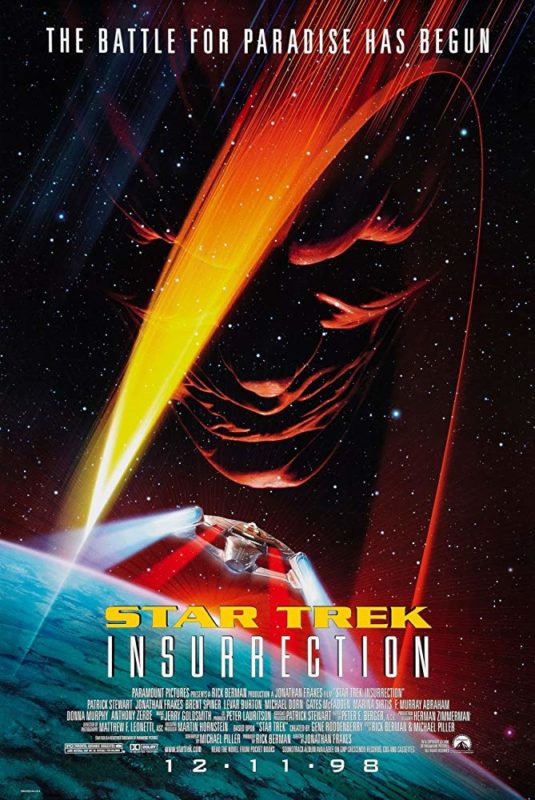
Star Trek: Insurrection (1998)
Maybe the most inappropriately named entry in the series. Insurrection (in which there is no violent uprising) feels like a double episode stretched to breaking point to fit on the big screen. This isn’t to say it doesn’t feel cinematic – in some ways, this is the most visually striking Star Trek movie I’ve seen so far. But the plot follows the classic TV formula of the Enterprise visiting a faraway planet to resolve a one-off situation, then leaving. There’s little attempt to make it seem like an especially important event in the lives of the crew (something the biggest hater of the fifth would concede it does), giving the impression they’re as unlikely to talk about it afterward as the audience. It’s not bad per se, but its forgettable finale leaves you asking ‘is that it?’
This time the alien race is the Ba’ku. Based on a blissful, picturesque, planet, they are an agricultural population divorced from the usual intergalactic conflicts and are one with Mother Nature. Think the Amish with tie-dye and a commune that looks like Caesar’s Palace. They’re all very wholesome, and look great for their age considering many are in their hundreds! Following a curious, but soon discarded, intro about Data going rogue we find out that this is because the “metaphasic radiation” around the planet acts like a fountain of youth. Hence their dying, disgruntled and face-lift obsessed former-allies the Son’a want to evict them to harness its power (that they’re falling to pieces annoyingly makes the baddies the underdogs). There’s a potentially rich satire on the beauty industry and society’s obsession with staying young. But any such intents are done a disservice by the plot adding up to a simple blood-feud. Maybe the selfish Ba’ku could do the Federation thing of sharing resources – after all, there’s more than enough room and radiation for a population of 600. They could help the whole darn galaxy! Luckily for them, the big bad Ru’afo is so underdeveloped, and unambiguously villainous, that ethical questions about the lives of their gated community vs the rest are asked without being engaged with. It’s rare to see the bad guys dastardly plot being to steal some medicine, and potentially save billions, but somehow Insurrection manages this. Isn’t there an old Vulcan saying about the needs of the few?
Anyway, there’s also annoyingly little debate among the crew. On one hand, it’s nice that they all agree. Still, inspiring though it may be, their constant camaraderie devalues the conundrum at the film’s core. I’d have loved to see at least one of them say maybe the Prime directive doesn’t need to be absolute. At least the original cast was divided by ideological and philosophical differences and could be relied upon to argue heart or head. Moreover, whilst it’s refreshing to see the integrity of The Federation go challenged, there’d have been greater gravity to the plot if their corruption was not explicitly limited to a few bad apples in an otherwise benevolent batch. This tension-vacuum isn’t helped by the dialogue repeatedly reminding us of the relatively low stakes. Still, Picard gets a great speech or two, which Stewart relishes – and they make up for a lot. As does his genuinely affecting relationship with Ba’ku woman Anij, who provides audiences a gateway to a Paccard that’s both sweetly vulnerable and unexpectedly smooth. Maybe Trekkies are used to this, I wouldn’t know from the show. But such scenes serviced the character well and kept me invested in the journey up until the more action-oriented third act (which has enough clever bits to entertain). Don’t get me wrong, it’s all quite passable- which I appreciate maybe stands in contrast to much of my review. But I found the faults in this film so blatant as to undo the good work elsewhere.
Also worth noting are some of the frankly bizarre bits that take the place of First Contact’s high-octane battles. First, and foremost, is Data’s goofy subplot in which he sings opera then befriends a small boy. It may sound juvenile on my part. But with repeated references to him following the young lad into the woods, them talking about playing together and finishing on them having a literal roll in the hay, it’s hard not to see an uncomfortable subtext. Then there’s Riker and Troi’s romance that competes with Anakin and Padame as the most cringe-inducing the genre has to offer. It doesn’t help that the characters are as much fun to watch flirt as your ex with your sibling. Odd parts like her shaving him in a bath diminish what little momentum there is. Nonetheless, the lovely scenery, hippy sensibilities, and fun premise mean I can’t get myself to really dislike it.
Rating: 




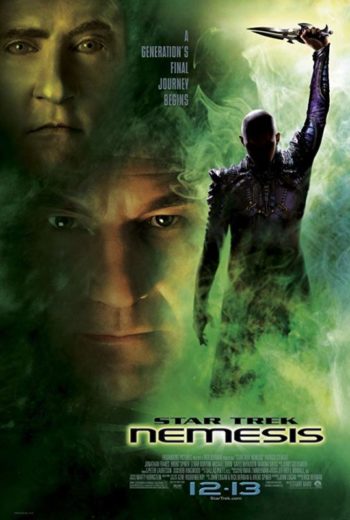
Star Trek: Nemesis (2002)
The Next Gen team sign off with their own version of Wrath of Khan. While it appears there were further sequels planned, it feels like a finale too: opening on a wedding (which Picard spoils with a self-congratulatory best man speech) and climaxes in a crew member sacrificing themselves (gee, I wonder where they got that idea). The trouble is it’s not fresh or competent enough to round things off for good. Moreover, by indelicately aping the series’ best entry, from which it lifts several plot beats, audiences watching the clunky storytelling unfold are constantly reminded of a much better film.
Still, though the plot is far from original, the movie does something I’ve never seen before. If Insurrection was unintentionally impressive in making the deprived Son’a seem like dicks, Nemesis goes one further by creating an enslaved race you couldn’t give a shit about: The Remans. Led by Shinzon, a Picard clone played by a young Tom Hardy, they planned to replace the real captain with his likeness to fuck things up for the Romulans. Needless to say, that didn’t go as planned, but he’s come back to take on the Federation with a superweapon. It’s an intriguing enough setup if a bit goofy. Moreover, Hardy does a serviceable performance at being fabulously evil. Yet the botched execution wastes both strings to its bow by spending too long on the past and too little fleshing them out in the present. The combo of too much backing story, and too little going on in the here and now, adds up a film that’s promising but frustratingly unrewarding.He talks a lot but is so thinly written he may as well be saying nothing, making him too cartoony to work as a dramatic foil. Unlike Khan, we just don’t buy that he has a lot of psychological depth or views himself as the good guy.
Moreover, unlike the last send-off, The Undiscovered Country, it’s surprisingly hollow. There’s very little heart to bolster the action scenes: a pretty major omission when it’s one last hurrah. Picard doesn’t even have much of an emotional journey, with his arc pailing in comparison to whatever midlife crisis the writers could find for Kirk. True, the fighty bits are reasonably done, even if it goes a bit Mad Max in the first act. But unlike in First Contact, they’re not used to serve the characters. The most important conflict, that between Picard and Shinzon, is also the sort of slow and clunky duel I’ve come to expect from weaker entries. The side-characters don’t get much to do either. As usual, Troi crashes the ship to save the day. And characteristically Data farts around in an ongoing quest for humanity – a concern I’ve been assured is handled thoughtfully on the small-screen but doesn’t translate well to the big one. This aspect of the film was workmanlike, when he met a doppleganger in B4, but is treated as too much of a sideshow ‘til the closing moments. These reasons and others may be why Nemesis was not well received on release – earning some of the worst reviews of the series to date and being beaten at the box office by Main in Manhattan. It’d be seven years before JJ Abrams brought the name back from stasis for his first reboot/ side-canon entry. I have extremely vague memories of it, and I haven’t seen either of the sequels. Though with 3 middling to bad entries (alongside an admittedly excellent entry) Nemesis pushing the makers towards a new direction may be the best thing that could have happened to the series at the time. As such, I shall look forward to changing that and getting back to you with one more blog. In the meantime, live long and prosper.
Rating: 




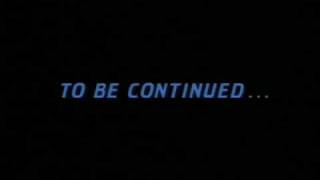
For more Star Trek, you can read about films 1-2 here, films 3-4 here and films 5-7 here.


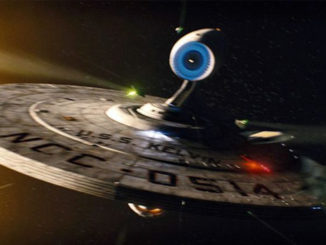
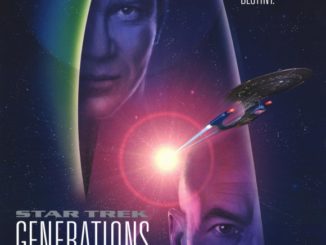
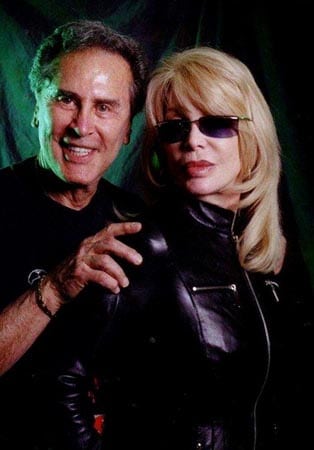
Be the first to comment